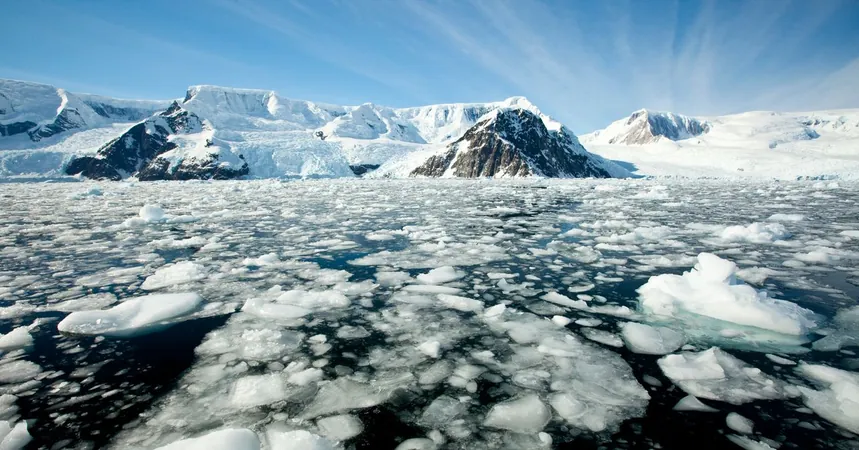
Antarctica's Ice Crisis: A Tipping Point Looms as Sea Levels Threaten Coastal Cities!
2025-08-30
Author: Amelia
From space, Antarctica may appear as a massive, serene ice sheet, but as you zoom in, its intricate and delicate system reveals itself—a complex dance between ocean waters, ice shelves, and ever-changing sea ice. This majestic region is now facing some of the most alarming transformations of our time, with dangerous consequences looming.
Shocking Changes Unveiled: Is Antarctica on the Verge of Collapse?
Recent research published in *Nature* highlights a series of "abrupt changes" that are rapidly reshaping Antarctica and its surrounding waters. These changes, such as significant sea ice loss, are interconnected and could soon trigger a catastrophic response that raises sea levels, threatening coastal cities worldwide.
"We’re observing unexpected shifts across Antarctica that are not isolated events," stated climate scientist Nerilie Abram, who led the groundbreaking study. "Alterations in one area can have ripple effects, amplifying crises elsewhere. These changes resonate on a global scale."
The Alarming Rate of Sea Ice Melt: The Numbers are Disturbing!
Antarctica’s winter sea ice has seen a staggering decline. In just a decade, it has shrunk by over 75 miles towards the coast, outpacing sea ice loss in the Arctic by more than four times in this period alone. What’s more, the past decade marks a decline akin to what the Arctic has experienced in almost half a century!
Ryan Fogt, a climatologist at Ohio University, notes, "The idea that Antarctica is immune to change like the Arctic is outdated; we are witnessing an alarming rate of change across the southern continent as well!"
Unraveling the Feedback Loop: Warming Leads to More Warming!
This drastic reduction in sea ice sets off a chilling feedback loop. As ice melts, darker ocean water is exposed, absorbing more heat and perpetuating the cycle of warming and melting.
"We expect this process to influence the southern hemisphere similarly, especially since we have lost a significant amount of sea ice," notes Abram.
Could We Face Irreversible Changes?
Unlike the Arctic, where stabilization might allow some ice recovery, models suggest that Antarctic ice continues to decline even under stabilized climate conditions due to the Southern Ocean's heat absorption capabilities.
The Threat to Ice Sheets: A Ticking Time Bomb!
As ice shelves melt, they lose their supportive role for the ice sheets on land. The West Antarctic Ice Sheet, for instance, risks collapse if global temperatures rise just 2 degrees Celsius above pre-industrial levels, potentially raising sea levels by over 10 feet! Matthew England, an oceanographer, warns that loss of ice shelves leads to increased flow of ice into the ocean, exacerbating the crisis.
The Impending Oceanic Catastrophe: What’s at Stake?
One critical consequence of melting ice shelves is the disruption of the Antarctic Overturning Circulation, which is essential for nutrient distribution in ocean ecosystems. This system, vital for phytoplankton—which absorb significant carbon dioxide—faces jeopardy as warming waters dilute the salty currents that drive it.
As sea ice dwindles, not only do marine life and phytoplankton suffer, but the very existence of species like emperor penguins is at risk. Their breeding colonies rely on stable sea ice, and with changing conditions, catastrophic breeding failures are on the rise.
The Long-Term Warning: A Call to Action!
The ongoing warming in Antarctic waters is a chronic issue, increasingly stressed by extreme weather events, such as the unprecedented heat wave in East Antarctica that shocked scientists in March 2022.
Fortunately, researchers are gaining insight into these changes, helping predict future patterns. The critical takeaway? Immediate and significant reductions in greenhouse gas emissions are essential to mitigate these outcomes.
"Every fraction of a degree of warming we can avoid is crucial to steering clear of disastrous changes," England emphasizes. "The potential sea-level rise of several meters could lead to unprecedented global instability."









 Brasil (PT)
Brasil (PT)
 Canada (EN)
Canada (EN)
 Chile (ES)
Chile (ES)
 Česko (CS)
Česko (CS)
 대한민국 (KO)
대한민국 (KO)
 España (ES)
España (ES)
 France (FR)
France (FR)
 Hong Kong (EN)
Hong Kong (EN)
 Italia (IT)
Italia (IT)
 日本 (JA)
日本 (JA)
 Magyarország (HU)
Magyarország (HU)
 Norge (NO)
Norge (NO)
 Polska (PL)
Polska (PL)
 Schweiz (DE)
Schweiz (DE)
 Singapore (EN)
Singapore (EN)
 Sverige (SV)
Sverige (SV)
 Suomi (FI)
Suomi (FI)
 Türkiye (TR)
Türkiye (TR)
 الإمارات العربية المتحدة (AR)
الإمارات العربية المتحدة (AR)